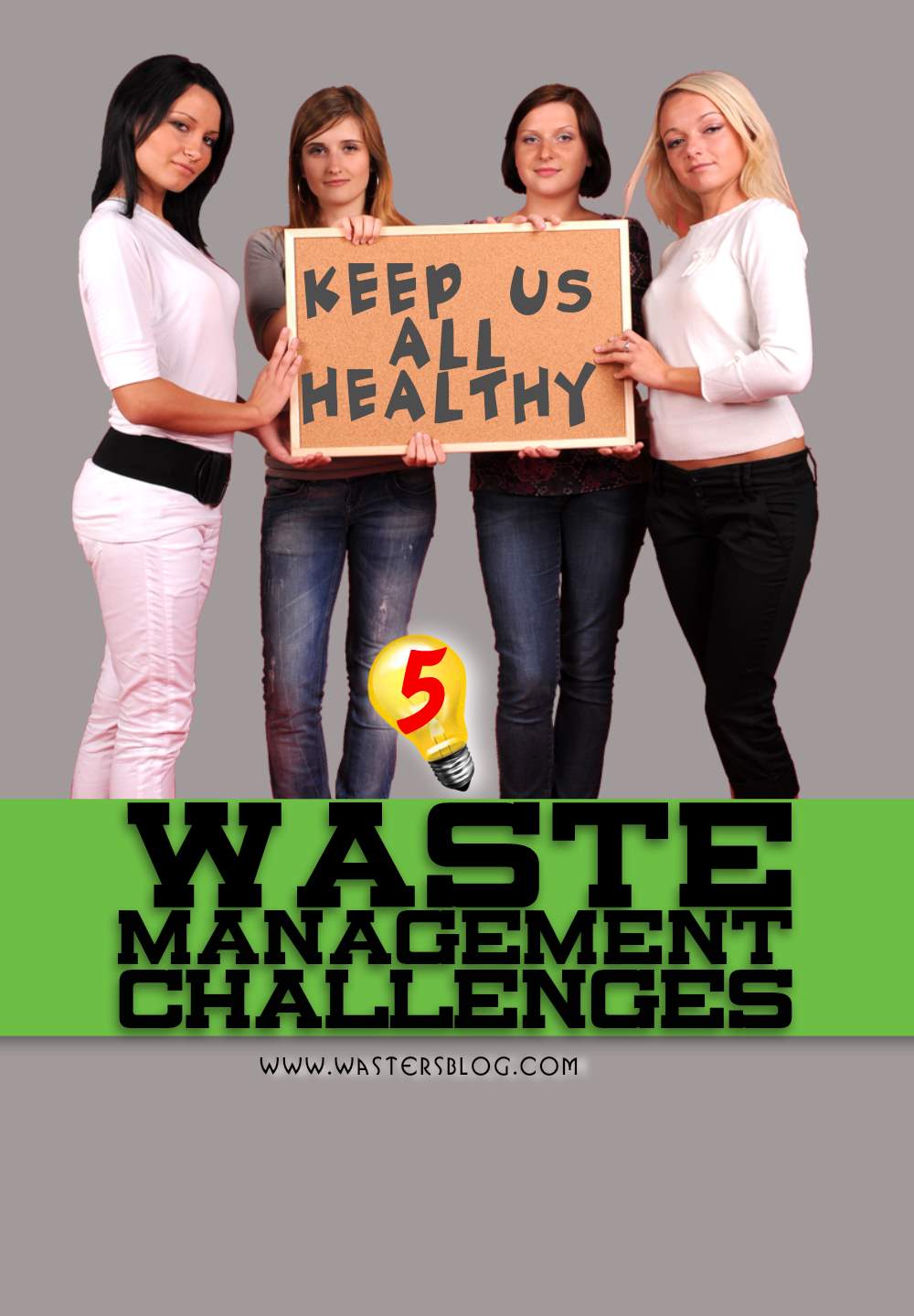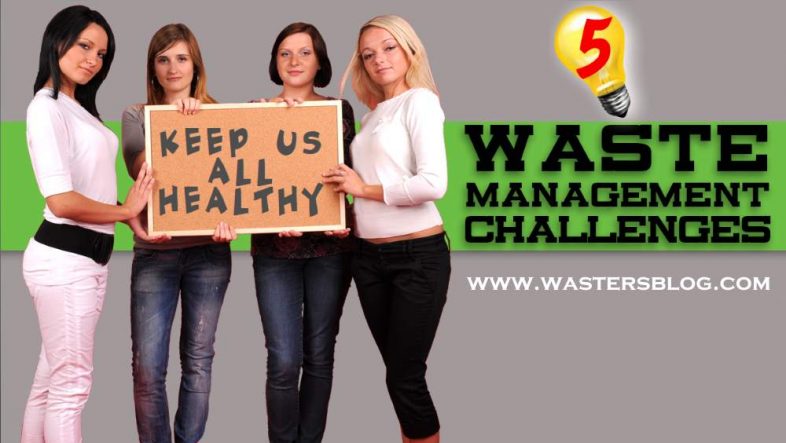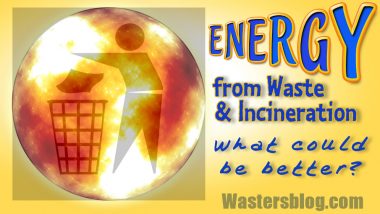Read on for our views on 5 top challenges of Waste Management to keep us all healthy. That includes the natural environment of the living creatures around us. But, before we start let us just clarify what Waste Management is, as follows:
Defining Waste Management
 Waste management is the collection, transportation, disposal or recycling and monitoring of waste. None of us like to have to pay for it, and we prefer not to think much about it. But, it is essential to avoid adverse effects on human health, animal habitats, and our natural environment in general.
Waste management is the collection, transportation, disposal or recycling and monitoring of waste. None of us like to have to pay for it, and we prefer not to think much about it. But, it is essential to avoid adverse effects on human health, animal habitats, and our natural environment in general.
Most people don’t think much about waste, until something goes wrong such as a strike by the waste collectors in an area.
When that happens rubbish starts to lie and rot in the streets. Very soon the local people begin to understand just how essential a service their local waste management/ sanitation department provides. In only 2 to 3 weeks, or sooner in hot weather, decomposition creates a nasty odour. Additionally, food will start to crawl with maggots, and the population of vermin such as mice and rats can easily rise exponentially. On such occasions the locals will say “bring back our rubbish collectors to keep us all healthy”.
Challenge 1 – Obtaining Adequate Funding for Local Waste Management Resources
Waste management is intended to reduce adverse effects of waste on health, the environment or aesthetics, from rubbish. It, without exception, seeks to do this with limited local resources, because there are always other strongly competing demands on public budgets.
The result is that it although the industry is devoted to the presentation and discussion of information on solid waste generation, characterization, minimization, collection, separation, treatment and disposal, there is never as much money as is needed.
Important work that address waste management policy, education, and economic and environmental assessments is the first to go during periods of economic austerity. Nothing stands still. Continuously developing and maintaining best practice, in recycling and general sanitation measures is essential. These can improve efficiency, and the industry is one in which unless steps are continually taken to move forward, moral in the operatives of these services, working the collection rounds, and sorting the waste for recycling in Waste Transfer Stations, MRFs standards can easily deteriorate and service standards drop backward. Maintaining energy and vision is always challenging for waste managers, but when this is achieved there is a massive benefit to the bottom line for businesses, as well as the environment.
Challenge 2 – Retaining Professional Highly Motivated Staff in the Waste Management Industry
A career in “waste” can be challenging, but is ultimately a very fulfilling area of work to get into.
Waste Management covers a huge range of duties. A career can be anything from a waste collection operative employed in a gang performing weekly general waste bin collections, to managers of high-tech waste processing plants recycling multiple waste-streams. Most likely with these facilities located on multiple sites.
Waste management staff don’t get the level of recognition among friends and relatives that most other industries attract. The job description of most is one which they seldom would wish to mention, despite it’s high merit to society and degree of responsibility. The result is that staff move away all the time into other industries, and retention of sufficient skills is a challenge for most waste companies.
It also industry often bears a reputation for being costly, time consuming and complex to manage, partly because employees often have to work across multiple locations. There can be easier ways to earn money…
Challenge 3 – The Industry has a High Climate Impact which Needs to be Addressed and Reduced
For far too long the climate impact of waste management has been overlooked. Previously considered a local issue, it is now clear that solid waste management has international and global implications for climate-change. To ameliorate the high carbon emissions produced by the waste sector will be essential. Not least, for the carbon emission reductions promised in the Paris Accord in 2016 to be achieved.
Solutions are nevertheless available across the United Kingdom to help manage all waste needs for the Commercial Sector in a sustainable way. Focusing on waste with improvements in solid waste management can also bring various co-benefits such as an improvement in air quality, and a reduction in contamination-related illnesses. Job generation created locally by the need to man and service waste processing facilities help generate economic growth, and every biogas plant boosts national energy resources. The challenge is to educate the public and politicians in the potential for reducing the climate change impact of sanitation measures.
Challenge 4 – Health and Safety for the Waste Management Industry
Unfortunately, WasteManagement Inc. is considered one of the most hazardous occupations with a high accident and illness rate, especially in developing countries. Apathy towards the problem, inadequacy of field level information and data, and resource constraints may be blamed for the dismal healthy and safety record of solid waste management. The shortcomings of waste regulation compliance is often most visible in our cities. It is certainly a challenge to maintain satisfactory waste management in many areas. Good waste practice is a challenge which needs good education and an awareness of global health preservation.
Waste Management Inc. is probably the largest global company in the industry. It often touts its status as the largest recycler in North America, and is adept at the public messaging that entails. But, its business model also means that it’s staff are susceptible to accidents, despite strenuous efforts being made to improve H&S performance/ reduce accidents.
Challenge 5 – Top-down, Regulatory and End-of-pipe Working Requirements
We would argue that argue that traditional top-down, regulatory and end of pipe approaches to waste management often leads to a variety of challenges. Particular problems are often seen in island communities, including technical concerns, financial restraints, a lack of capacity, limited education and low public awareness. These are natural. But, corruption, stakeholder influence and poor planning must be stamped upon.
This is important since the environmental consequences of waste management often depend more on the impacts on surrounding systems than on the emissions from the waste management system itself. Apathy towards the problem, inadequacy of field level information and data, and resource constraints may be blamed for the dismal situation of solid waste management often visible in our cities.
Challenge 5 – Smart Waste Management
The industry has been subject to much change recently. The result of the introduction of alternate weekly waste collections, has been the rise of commercial recycling services, garden waste subscriptions and an expansion of curbside recycling have all contributing to your council’s burden. But, if handled correctly studying the latest ‘smart” technology and implementing it as in other industries, can result in reductions in overall resourcing requirements, raise recycling levels, and still give councils the savings requirements they need.
The need for e-waste management has been increasing from the past decade. A conclusion is that the methodology facilitates the analysis, but that problems remain as municipal waste management often diverge from existing economic systems. Cutbacks then also mean that normal waste considerations, often now fall on the wayside, with critical services taking top priority but others lacking in support.
Other Long Standing Waste Management Challenges
Despite essential precautions for bad weather it is known that, waste management often doesn’t enjoy a high profile in a commercial organisation except until it goes wrong.
Solid waste management has moved to the forefront of the environmental agenda. But it still tends to be the visual aspect of poor waste sanitation services that has the greatest effect on the reputation of households, businesses and local areas. via our own data.






Have to agree that it is essential to avoid adverse effects on human health, animal habitats, and our natural environment in general. Skip bins sunshine coast helping to keep our environment clean and healthy.